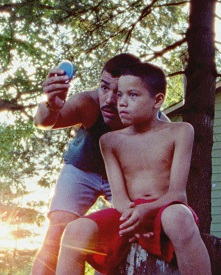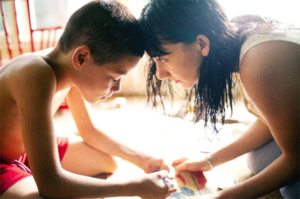We the Animals
 Justin Torres’ 2011 novel “We the Animals” has a haunting, dreamlike aura about it. While its subject matter is a coming-of-age story of three young brothers living in upstate New York in the 1980s, there’s a certain surreal quality to the writing that makes adapting it for film quite a chore. I’m happy to say director Jeremiah Zagar (and co-screenwriter Dan Kitrosser) succeed in bringing this delicate touch to the sometime heavy subject matter; but I’m disappointed to report that “We the Animals” probably should never have been committed to the medium of film in the first place. This is the kind of story that belongs to the written word.
Justin Torres’ 2011 novel “We the Animals” has a haunting, dreamlike aura about it. While its subject matter is a coming-of-age story of three young brothers living in upstate New York in the 1980s, there’s a certain surreal quality to the writing that makes adapting it for film quite a chore. I’m happy to say director Jeremiah Zagar (and co-screenwriter Dan Kitrosser) succeed in bringing this delicate touch to the sometime heavy subject matter; but I’m disappointed to report that “We the Animals” probably should never have been committed to the medium of film in the first place. This is the kind of story that belongs to the written word.
The cast
Newcomers Evan Rosado, Isaiah Kristian, and Josiah Gabriel star as the three brothers – sons of a Puerto Rican father (Raul Castillo) and an Italian-American mother (Sheila Vand), who have moved upstate to escape the rough-and-tumble Brooklyn life. Ma works in a bottling factory and Paps is a night watchman. They do the best they can for their three boys, and some early scenes demonstrate the love inherent in their family bond.
The plot
But when Paps inadvertently terrorizes young Jonah (Rosado) on a weekend camping excursion, we begin to see that not all is as copacetic as originally meets the eye. You see, Paps’ idea of teaching Jonah to swim is to simply leave him in the middle of the lake and hope for the best. His near-drowning results in a fight between Ma and Paps. A physical fight. One that leave Ma bruised and hurting. And one which results in Paps leaving the family home for an undisclosed period of time.
Comparison to “The Florida Project”
 Upon Paps flight, Ma withdraws to her bed, with no apparent gumption to do anything for herself or for her boys. She refuses to cook, clean, and (apparently) work – leaving the boys to their own occasionally destructive behavior. Their daily escapades (and no mention of school is made, so our presumption is this is summer) run the gamut from throwing rocks at passing cars to foraging for food in public trash cans. It is during these scenes I first made the mental comparison of “We the Animals” to last year’s “The Florida Project.” But the difference is that while “Florida” introduced us to the overlooked subculture of families living in roadside motels, “Animals” has no such overarching societal mission. It is simply a story about three unattended boys.
Upon Paps flight, Ma withdraws to her bed, with no apparent gumption to do anything for herself or for her boys. She refuses to cook, clean, and (apparently) work – leaving the boys to their own occasionally destructive behavior. Their daily escapades (and no mention of school is made, so our presumption is this is summer) run the gamut from throwing rocks at passing cars to foraging for food in public trash cans. It is during these scenes I first made the mental comparison of “We the Animals” to last year’s “The Florida Project.” But the difference is that while “Florida” introduced us to the overlooked subculture of families living in roadside motels, “Animals” has no such overarching societal mission. It is simply a story about three unattended boys.
Mischief
When caught stealing vegetables from a nearby farm, the farmer’s grandson introduces the boys to hard rock music (which they don’t seem to understand) and porn videos (which they do, even though they’re not old enough to comprehend sexual violence). Jonah subsequently confides in the farmer grandson’s basement room when the tension in his own home becomes so volatile he requires a place of solace. The homosexual angle of their relationship of necessity is barely explored in Zagar’s film – which is just as well; such a cinematic twist would have taken the narrative in a distracting, unnecessary direction.
Sketches
Jonah also finds consolation in his colored-pencil sketches depicting the trials and tribulations of his daily life – sketches so personal and important he hides them under his bed, and only works on them after his brothers have gone to sleep for the night. These sketches (which come to life thanks to the animation of Mark Samsonovich) solidify that which young Jonah deems important, and those life episodes to which he has borne witness. Drowning in a lake takes up a lot of paper. As does the dichotomy surrounding his parents – some of his drawings depict their love for one another, others their pent-up hatred.
Continuing violence
Eventually, Paps returns and all is well. Until it isn’t. The physical violence never seems to completely dissipate, and the boys increasingly rely on their own friendship and family bond to find solace in their world.
Absence of school
The fact that school is not a part of “We the Animals” is an interesting and odd omission. As winter takes its hold over upstate New York, one would expect the introduction of a caring teacher or guidance counselor to the narrative – or at least a fellow classmate whose life is also plagued by difficult family circumstances.
Absence of shirts
The fact that the boys spend the majority of the film shirtless is another quandary. Such a directorial choice would have made sense had the story been set in tribal Africa. But in the woods of upstate New York? Where even the summers are never truly “hot?” I’m not sure why this decision was made, but the result is that the boys appear to hail from another world – as though the setting were immaterial to our comprehension of their plight. And perhaps that’s the point. That no matter how foreign or remote the environment, the bond of brotherhood is universal.
Dreamlike quality
I can’t quite recommend “We the Animals,” although it’s certainly a cut above much of the tripe Hollywood produces. The mischievous antics of the three brothers invokes “The Florida Project,” albeit without the societal angle. Jonah’s sketches and his ethereal voice-over narration evokes something out of a Terence Malick film. Zak Mulligan‘s grainy cinematography lends a home-movies feel to the entire project. The result is a hypnogogic paean to the heartaches and occasional joys of youth and brotherhood.
Andy Ray’s reviews also appear on http://youarecurrent.com/category/nightandday/film-reviews/
and he serves as the radio film critic for https://indyboomer.com/radio/